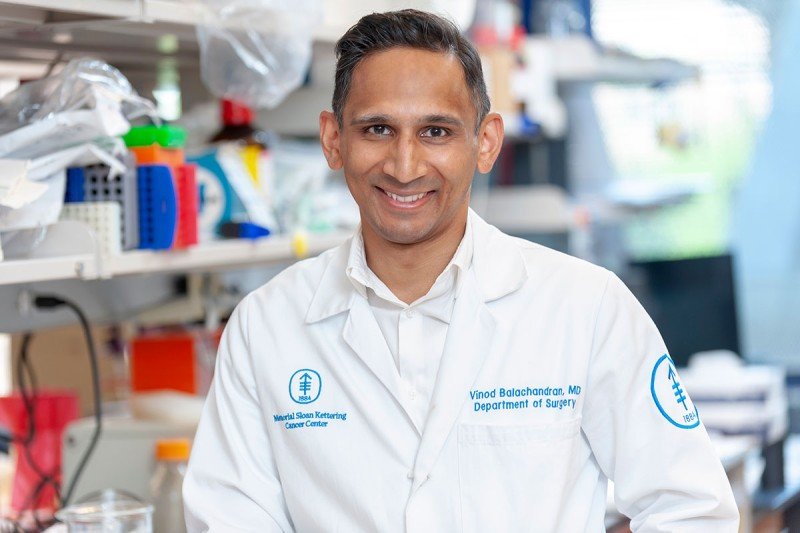
Surgeon-scientist Vinod Balachandran says pancreatic cancer is difficult to detect early and often has spread to nearby organs when it is diagnosed.
This story was originally published in March of 2019.
Pancreatic cancer has been much in the news this past year, afflicting prominent figures such as Jeopardy! host Alex Trebek and Sex and the City actor Willie Garson. As a result, many people have been asking questions about this disease and its prognosis. MSK surgeon-scientist Vinod Balachandran, who has a particular research interest in pancreatic cancer, studies personalized cancer vaccines and other immunotherapies to treat people with the disease. Here, he discusses current treatment options and the most promising research in the field.
1. What is the outlook for someone diagnosed with pancreatic cancer?
Compared with most other cancers, pancreatic cancer has a less favorable prognosis. The five-year survival rate for people with all types of pancreatic cancer is approximately 9%. For someone diagnosed with stage IV pancreatic cancer — meaning the cancer has spread from the pancreas to other organs — the median survival time is approximately one year. Overall, pancreatic cancer remains one of the most difficult cancers to treat.
In fact, pancreatic cancer is expected to become the second leading cancer killer in the United States by 2025, second only to lung cancer. Other diseases such as breast cancer, prostate cancer, and colorectal cancers are far more common, but we have more-effective therapies for them. There could be a national pancreatic cancer crisis unless we find better treatments.
2. What are some of the risk factors for developing pancreatic cancer?
The strongest risk factors for pancreatic cancer are smoking, obesity, and diabetes. You also are at a higher risk if you are older than 55 or if you are African American. You are at a much higher risk if you have a family history of pancreatic cancer, defined as two or more first-degree relatives [parents, siblings, or children] with pancreatic cancer.
3. How is pancreatic cancer usually treated?
The mainstays of pancreatic cancer treatment are surgery, chemotherapy, and radiation. Patients have much better outcomes if we can remove the tumor with surgery. Most people, however, can’t have surgery because when they are diagnosed the disease has already spread outside of the pancreas into other organs such as the liver. Some newer treatments that have shown great success in other cancers, such as targeted therapies and immunotherapy, have not yet made significant inroads into pancreatic cancer care. But that is rapidly changing.
4. What are some reasons to be optimistic about the future?
There has been great progress in pancreatic cancer research and treatment. First, we are getting significantly better at giving standard treatments. Last year, a study showed that a combination of four chemotherapy drugs given after surgery could extend overall survival to nearly five years. This applies only to a particular group of patients, but it might be possible to replicate this success for other groups.
We also are learning that targeted therapies could be helpful in subsets of people with pancreatic cancer. A class of drugs known as PARP inhibitors has shown promise in treating certain pancreatic tumors in people with inherited mutations in the BRCA genes. These are the same genes that have been linked to hereditary breast and ovarian cancer, and PARP inhibitors have shown they can be effective against these cancers.
The other new area of research is immunotherapy. So far, pancreatic cancers have been resistant to this form of treatment. But as we learn more about the molecular makeup of pancreatic cancers, it will help us to develop better immunotherapy approaches. For example, we have learned that people with pancreatic cancer whose tumors had a certain type of mutation called mismatch repair will respond to immunotherapy drugs called checkpoint inhibitors. The FDA approved a checkpoint inhibitor drug, pembrolizumab (Keytruda®), for patients with this mutation in 2017. Even though pembrolizumab has helped only a small fraction of people with pancreatic cancer, it proves that immunotherapy can actually work for this disease.
Overall, people today have many more options than they did ten years ago. Even if standard therapies stop working, there are more treatment choices and clinical trials available. For the first time in a long while, there is a real belief in the pancreatic cancer community that we can effectively treat this disease. But more research is needed to develop better treatments. Progress requires research.


